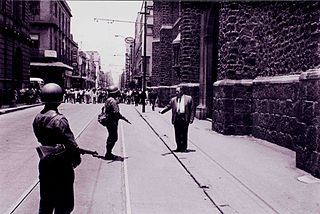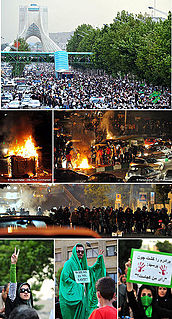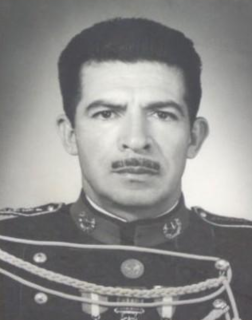 W
WDuring the early stages of the Iraq War, United States Army and Central Intelligence Agency personnel committed a series of human rights violations against detainees in the Abu Ghraib prison in Iraq, including physical and sexual abuse, torture, rape, sodomy, and murder. The abuses came to public attention with the publication of photographs of the abuse by CBS News in April 2004. The incidents received widespread condemnation both within the United States and abroad.
 W
WThe Algerian Civil War was a civil war in Algeria fought between the Algerian Government and various Islamist rebel groups from 26 December 1991 to 8 February 2002. The war began slowly as it first appeared the government had successfully crushed the Islamist movement, but armed groups emerged to fight jihad and by 1994, violence had reached such a level that it appeared the government might not be able to withstand it. By 1996–97, it had become clear that the Islamist resistance had lost its popular support, although fighting continued for several years after.
 W
WThe 2009 Ashura protests were a series of protests which occurred on 27 December 2009 in Iran against the outcome of the June 2009 Iranian presidential election, which demonstrators claim was rigged. The demonstrations were part of the 2009 Iranian election protests and were the largest since June. In December 2009, the protests saw an escalation in violence.
 W
WThe Caravan of Death was a Chilean Army death squad that, following the Chilean coup of 1973, flew by helicopters from south to north of Chile between September 30 and October 22, 1973. During this foray, members of the squad ordered or personally carried out the execution of at least 75 individual communists held in Army custody in certain garrisons. According to the NGO Memoria y Justicia, the squad killed 97 people: 26 in the South and 71 in the North. Augusto Pinochet was indicted in December 2002 in this case, but he died four years later without having been judged. His trial, however, is ongoing since his and other military personnel and a former military chaplain have also been indicted in this case.
 W
WThe Central American crisis began in the late 1970s, when major civil wars and communist revolutions erupted in various countries in Central America, causing it to become the world's most volatile region in terms of socioeconomic change. In particular, the United States feared that victories by communist forces would cause South America to become isolated from the United States if the governments of the Central American countries were overthrown and pro-Soviet communist governments were installed in their place. Throughout the second half of the twentieth century, the United States often pursued its interests through puppet governments and the elite classes, whose members tended to ignore the demands of the peasant and working class.
 W
WThe Chechen–Russian conflict is the centuries-long conflict, often armed, between the Russian government and various Chechen forces. Formal hostilities date back to 1785, though elements of the conflict can be traced back considerably further.
 W
WThe 1973 Chilean coup d'état was a military coup in Chile that deposed the Popular Unity government of President Salvador Allende. On 11 September 1973, after an extended period of social unrest and political tension between the opposition-controlled Congress and the socialist President, as well as economic warfare ordered by U.S President Richard Nixon, a group of military officers led by General Augusto Pinochet and Admiral José Toribio Merino seized power in a coup, ending civilian rule.
 W
WThe Contras were the various U.S.-backed and funded right-wing rebel groups that were active from 1979 to the early 1990s in opposition to the Marxist Sandinista Junta of National Reconstruction Government in Nicaragua. Among the separate contra groups, the Nicaraguan Democratic Force (FDN) emerged as the largest by far. In 1987, virtually all contra organizations were united, at least nominally, into the Nicaraguan Resistance.
Juan Manuel Guillermo "Mamo" Contreras Sepúlveda was a Chilean Army officer and the former head of the National Intelligence Directorate (DINA), Chile's secret police during the dictatorship of General Augusto Pinochet. In 1995, he was sentenced to seven years in prison for the murder in Washington, D.C. of Chilean diplomat Orlando Letelier, which he served until 2001.
 W
WThe Corsican conflict is a nationalist conflict in Corsica during the mid 20th century and the early 21st century. Also known as the French Troubles, and the Conflict in Corsica, it is sometimes described as a low-intensity conflict. The conflict began in 1976.
 W
WA death squad is an armed group whose primary activity is carrying out extrajudicial killings or forced disappearances as part of political repression, genocide, ethnic cleansing, or revolutionary terror. Except in rare cases where they are formed by an insurgency, domestic or foreign governments actively participate in, support, or ignore the death squad's activities. Death squads are distinct from assassination due to their permanent organization and the larger number of victims who may not be prominent individuals. Other violence, such as rape, torture, arson, or bombings may be carried out alongside murders. They may comprise a secret police force, paramilitary militia groups, government soldiers, policemen, or combinations thereof. They may also be organized as vigilantes. When death squads are not controlled by the state, they may consist of insurgent forces or organized crime, such as the ones used by cartels.
 W
WThe Mexican Dirty War refers to the Mexican theater of the Cold War, an internal conflict in the 1960s and 1970s between the Mexican PRI-ruled government under the presidencies of Gustavo Díaz Ordaz, Luis Echeverría and José López Portillo, which were backed by the US government, and left-wing student and guerrilla groups. During the war, government forces carried out disappearances, estimated at 1,200, systematic torture, and "probable extrajudicial executions".
 W
WExtrajudicial killings and forced disappearances in the Philippines are illegal executions – unlawful or felonious killings – and forced disappearances in the Philippines. These are forms of extrajudicial punishment, and include extrajudicial executions, summary executions, arbitrary arrest and detentions, and failed prosecutions due to political activities of leading political, trade union members, dissident and/or social figures, left-wing political parties, non-governmental organizations, political journalists, outspoken clergy, anti-mining activists, agricultural reform activists, members of organizations that are allied or legal fronts of the communist movement like "Bayan group" or claimed supporters of the NPA and its political wing, the Communist Party of the Philippines (CPP).
 W
WProtests against the results of the highly controversial 2009 Iranian presidential election, a disputed victory by President Mahmoud Ahmadinejad, in support of opposition candidates Mir-Hossein Mousavi and Mehdi Karroubi, occurred in major cities nationwide from 2009 into early 2010. The protests were titled the Iranian Green Movement by its proponents, reflecting Mousavi's campaign theme, and Persian Awakening, Persian Spring or Green Revolution, reflecting the "Persian identity" of Iranians and the so-called "colour revolution" theme.
 W
WThe Phoenix Program was a program designed and coordinated by the United States Central Intelligence Agency (CIA) during the Vietnam War, involving cooperation between American, South Vietnamese and Australian militaries.
 W
WThe Rettig Report, officially The National Commission for Truth and Reconciliation Report, is a 1991 report by a commission designated by then-President Patricio Aylwin detailing human rights abuses resulting in deaths or disappearances that occurred in Chile during the years of military dictatorship under Augusto Pinochet, which began on September 11, 1973 and ended on March 11, 1990. The report found that over 2,000 people had been killed for political reasons, and dozens of military personnel have been convicted of human rights abuses. In addition, many reforms have been made based on the recommendations of the report including an official reparations department.
 W
WJosé Efraín Ríos Montt was a Guatemalan general, politician, and war criminal who served as President of Guatemala. Born in Huehuetenango, he was a dictator who took power as a result of a coup d'état on March 23, 1982. He was overthrown by his defense minister, Óscar Humberto Mejía Victores, in another coup d'état on August 8, 1983. In the 2003 presidential elections, Ríos Montt unsuccessfully ran as the candidate of the Guatemalan Republican Front (FRG). In 2007 he returned to public office as a member of Congress, thereby gaining prosecutorial immunity. He was protected from a pair of long-running lawsuits alleging war crimes against him and a number of his former ministers and counselors during their term in the presidential palace in 1982–83. His immunity ended on January 14, 2012, with the end of his term in legislative office. On January 26, 2012, he appeared in court in Guatemala and was formally indicted for genocide and crimes against humanity.
 W
WGeneral René Schneider Chereau was the commander-in-chief of the Chilean Army at the time of the 1970 Chilean presidential election, when he was assassinated during a botched kidnapping attempt. He coined the doctrine of military-political mutual exclusivity that became known as the Schneider Doctrine.
 W
WThe Second Chechen War, also known as the Second Chechen Сampaign ) or the Second Russian invasion of Chechnya from the rebel Chechen point of view, was an armed conflict on the territory of Chechnya and the border regions of the North Caucasus between the Russian Federation and the Chechen Republic of Ichkeria, also with militants of various Islamist groups, fought from August 1999 to April 2009.
 W
WThe Troubles was an ethno-nationalist conflict in Northern Ireland during the late 20th century. Also known internationally as the Northern Ireland conflict, it is sometimes described as an "irregular war" or "low-level war". The conflict began in the late 1960s and is usually deemed to have ended with the Good Friday Agreement of 1998. Although the Troubles primarily took place in Northern Ireland, at times the violence spilled over into parts of the Republic of Ireland, England, and mainland Europe.